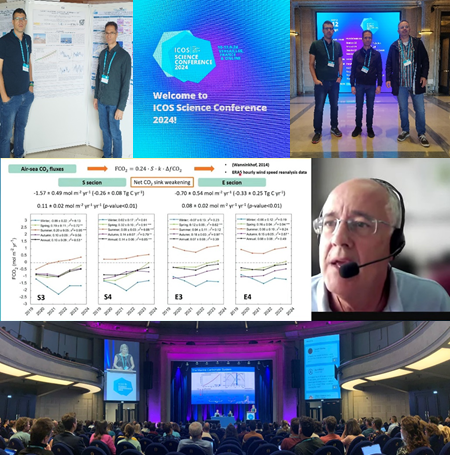Active participation of Spanish researchers in the ICOS Science Conference 2024
The ICOS Science Conference 2024, held from 9th to 12th September in Paris (France), brought together numerous global experts who presented their latest results and the new methodologies developed to measure greenhouse gases and estimate their fluxes in urban, oceanic, and ecosystem environments. This scientific event, key in the global fight against climate change, featured active participation from Spanish researchers, belonging to various national institutions, who presented their contributions in both poster and oral presentation formats (Figure 1).

Figure1. Summary of Spanish participation in the ICOS Science Conference 2024. (Upper panel) Researchers Pedro Pablo Rivas (AEMET), Dr. Arnaud Carrara (CEAM), and technician Sergio León (TragsaTec); (centre panel) Dr. Melchor González Dávila during his presentation; and (lower panel) a panoramic view of attendees in the main conference hall.
With the aim of highlighting the joint efforts of researchers from the national ICOS-Spain network, two posters were presented at this scientific event, focusing on the synergies that can be achieved by combining data from multiple stations. The first study relates CO₂ measurements from the ESTOC oceanic station and the Izaña atmospheric station. The records from these stations show how the increased presence of atmospheric CO₂ correlates with a significant rise in ocean acidification during the period 1995-2024. Additionally, the seasonal variability of CO₂ in both environments is shown. The ESTOC station is an example of collaboration involving three independent institutions: the Oceanic Platform of the Canary Islands (PLOCAN), the University of Las Palmas de Gran Canaria (ULPGC), and the Spanish Institute of Oceanography (IEO-CSIC). Meanwhile, Izaña is managed by the Spanish Meteorological Agency (AEMET).
The second poster studies the high levels of CO2 and CO detected by the El Arenosillo and Izaña atmospheric stations during the summer of 2023. These records were the result of smoke plumes arriving from the extensive wildfires in Canada, which raised significant concern among the public due to their negative impact on air quality. This study highlights the importance of understanding atmospheric dynamics to assess the impact of remote events on distant regions. Both studies were presented by researchers Pedro Pablo Rivas and Sergio León during their participation in the conference.
In parallel, researchers Dr. José Antonio Adame and Raúl Padilla from the El Arenosillo station, located in the southwest of the Iberian Peninsula, presented two posters: the first focused on CO₂, CH₄, and CO measurements obtained from the instrument tower at the station, and the second on analyzing the behavior of atmospheric CH₄ in the same region. The El Arenosillo station is managed by the National Institute of Aerospace Technology (INTA).
In the oceanic field, Dr. Melchor González Dávila, principal investigator of the Canoa-VOS ocean station and head of the Marine Chemistry research group (QUIMA), presented the latest results on the dynamics of surface CO₂ in the western Mediterranean through an oral presentation. His study revealed a concerning increase in both temperature and acidification of the Mediterranean Sea.
Finally, Dr. Arnaud Carrara, principal investigator of the Majadas de Tiétar ecosystem station, presented the first results of the URBFLUX project, which focuses on monitoring CO₂ in the urban and peri-urban areas of Valencia. The Majadas de Tiétar station is managed by the Mediterranean Center for Environmental Studies (CEAM).
The strong Spanish participation in the ICOS Science Conference 2024 reaffirms the commitment of ICOS-Spain researchers to achieving high-precision and high-quality data that assist the scientific community in studying climate change.
